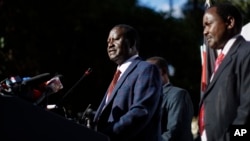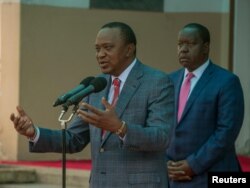Since Friday, when Kenya's electoral commission announced President Uhuru Kenyatta had been re-elected, opposition candidate Raila Odinga has been telling supporters to stay tuned for his NASA coalition's next steps.
He ended the suspense Wednesday when he announced the coalition will take its case of what he called a “stolen election” to the Supreme Court, despite previous statements to the contrary.
“By going to court, we are not legitimizing misplaced calls of some [electoral] observers for us to concede, but are seeking to give those who braved the long lines and the morning chill, and out all afternoon on Tuesday, Aug. 8, 2017 — mothers with their children tied on their backs, the sick, people with disabilities, old and young — a chance to be heard,” said Odinga.
Odinga asserts the voting system was hacked. These allegations led him to begin his announcement Wednesday by giving the title of his statement, “Kenyans Say No to Computer-Generated Leaders.”
The best move
University of Nairobi lecturer Herman Manyora believes going to court is the best move for Odinga and NASA.
“I think this will be the best option because first of all, it deals with the anxiety within the country, the tension it will ease, and you, 14 or so days when he's in the court is enough for people to heal, for people to act out of thinking and not out of emotions, so it's like you buy time even for grief. You know, for you to go through grief. But it's also much better because then you put your case forward in an environment that allows you to do so systematically,” said Manyora.
Odinga justified his previous refusals to consider court action by referencing what he called the government's “determination to silence all voices” by attempting to shut down two Kenyan rights groups in recent days, and said NASA would now be laying out their evidence before the whole world via the court process.
Legal action suspended
The acting secretary for the interior, Fred Matiangi, has ordered a 90-day suspension of legal action against the rights groups.
The action came after police and revenue officials attempted to raid the African Center for Open Governance offices early Wednesday, and the NGO coordination board de-registered the Kenya Human Rights Commission on Tuesday.
Odinga also left the door open to future demonstrations.
“We will preach peace, as we have done so. And we will uphold our rights to assemble and protest. We shall hold vigils, moments of silence, beat drums, and do everything else to peacefully draw attention to the gross electoral injustices being meted on our country, and demand redress,” said Odinga.
The electoral commission says Kenyatta won the election with 54.3 percent of the vote, beating Odinga's 44.8 percent.





